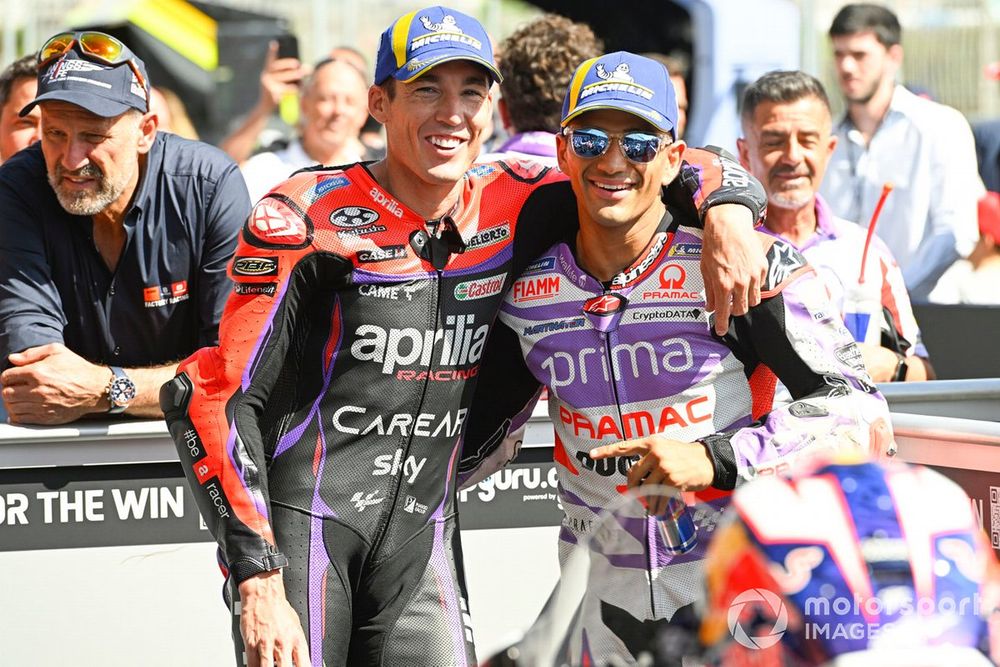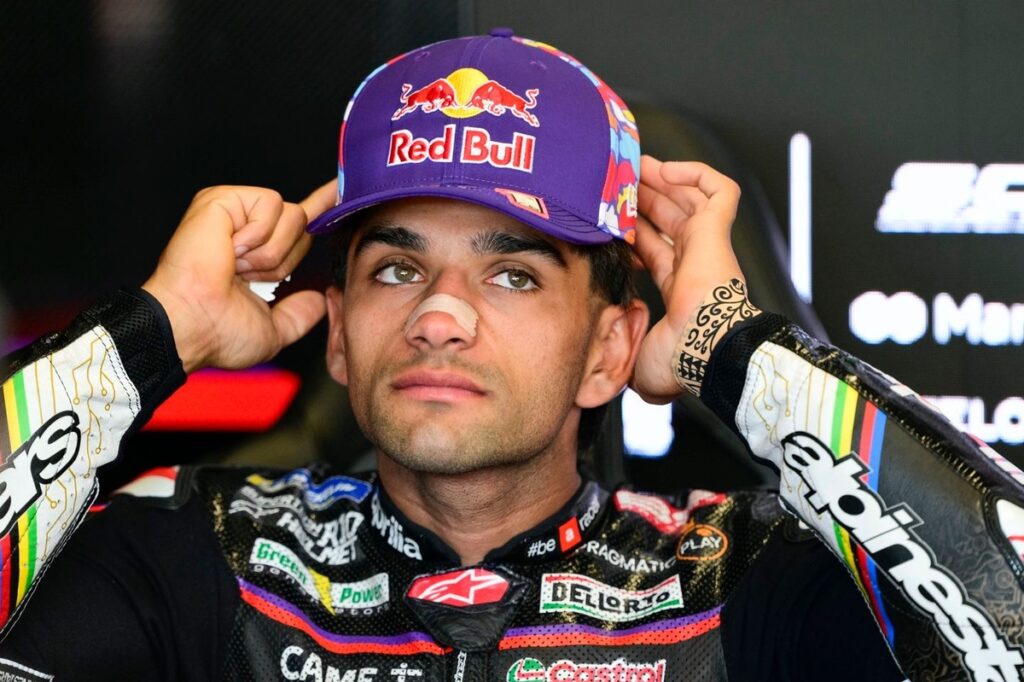Jorge Martin suffered a serious injury on the first day of 2025 MotoGP pre-season testing in February, leading to a gruelling spell of crashes, surgeries and hospital stays that kept him off track until the Czech Grand Prix at the end of July.
Since then, little by little, he has been regaining normality, even if he insists that this second part of the season is just preparation for 2026.
Q: In 2024 you won the MotoGP world championship with a satellite team, something that had never been done before. Do you think it was valued as it should have been?
“It depends who you ask. I think inside the paddock people could sense what it means to win with a satellite team. Twelve people against a factory of two hundred. In general, people don’t realise how difficult it is.
“Honestly, I don’t think it will ever happen again. You may think you have the same technical material, but the best engines and the best parts go to the factory team, obviously, because it’s the factory rider, with all the support behind him. There’s no comparison with a private team. Definitely, from the outside it wasn’t valued, and people don’t realise how hard it was to achieve.”
Q: What has changed in the Jorge Martin who fought for the title in 2023 and 2024, compared to the one who has gone through an ordeal of injuries this year and fallen out of contention for victories?
“The mentality. I think when you win a MotoGP world championship, or achieve a goal you’ve been fighting for your whole life, certain parameters change, and you have to find the meaning, the why am I still doing this if the objective is already achieved.
“From there comes another stage, which is the meaning—why am I racing motorcycles, why am I risking my life. Then you have to search for the reason: for my family, for my future kids, for the love of this sport, because I love the pressure…”
Jorge Martin, Aprilia Racing
Photo by: Gold and Goose Photography / LAT Images / via Getty Images
Q: The Qatar injury and being hospitalised there for 10 days was a turning point….
“Everything I’ve lived through with the injuries has made me grow a lot mentally. When you’re saying goodbye to your mother because you think you’re going to die, I think there’s a click in your head, and you rethink many things. The turning point is being able to overcome that situation and return to competing at the highest level, giving the best of yourself. Because now you’re no longer obsessed with winning, you’re obsessed with improving, with being a better rider, a better person. That’s why I think overall it has made me a much better person than I was.”
Q: You even thought about retiring, about leaving bikes behind. Was that just a phrase, or did you actually consider it?
“This time I didn’t consider whether to retire or not, what I had were doubts about whether I’d be able to ride a bike again, which is different. At no time did I think I wanted to quit; I always wanted to recover to ride again. For three weeks, I had to disconnect a little from the world, forget everything, just go to the beach and look at the sea – that was happiness for me. But it wasn’t about whether I was going to retire or not, it was about whether I could be fast again. At that moment many doubts arise in your head, and it’s a time of a lot of frustration and weakness.”
Q: Having started working with a psychologist years ago. Has that served as preventive work for everything you’ve gone through with the injuries?
“No. I consider myself a very honest person. I always say what I think, and when I was asked if I worked with a psychologist, I admitted it, and many stories were created around that. Most riders who use a psychologist maybe have a taboo about not wanting to say it, or think it’s a sign of weakness. But for me it’s the opposite, it’s a sign of strength, of wanting to improve also on a mental level. Before, I did weekly sessions and now I’m in contact all the time, I’ve hired him as part of my team. I consider the psychologist like another mechanic, like a trainer. For me he’s super important.”
Q: How did he help you?
“He warned me that the challenge ahead was the hardest thing I would ever go through in my life. That I wasn’t going to come back and win. That I was coming from winning and now I’d be 18th, and that’s not easy. He helped prepare me for it… it didn’t hit me out of the blue. Maybe if I hadn’t been prepared for it, I would have given up. Now it’s the opposite: being 18th in a practice makes me bring out the best in myself.”

Jorge Martin, Pramac Racing, Aleix Espargaro, Aprilia Racing Team
Photo by: Gold and Goose Photography / LAT Images / via Getty Images
Q: Outwardly, you give the image of being a strong person, someone who knows what he wants and doesn’t want, but at the same time you have a very structured environment that helps you a lot…
“The environment means everything to me, especially in low moments, when you have a bad day or a bad practice, when you come back to the motorhome sad and frustrated. Having someone who knows how to be there, not someone who takes you out of that moment – because you need to have those moments too – but who knows when to change the chip and make you smile. To go from admitting it went badly, to looking for why it went badly. Perfect, be critical, but quickly look forward.”
Q: You’ve spoken about your father, who works as your assistant and is always with you, someone known for being discreet and staying in the background. However, when the Aprilia contract controversy broke out, he wrote a post on Instagram. Did that surprise you?
“It didn’t surprise me, but I didn’t know about it. My father is a very introverted person. People give opinions, criticise, throw ‘hate’, but they don’t realise how much parents suffer with the hate on social media. Honestly, after so many years as an elite athlete, I don’t care. I even laugh. I like seeing the criticism because it’s nonsense. I’d like people, instead of throwing hate, to make constructive criticism, but of course, they can’t, and that hurts my family. And my family, at some point, has to let it out, and they can’t with me, because I tell my father: ‘If it bothers you, it bothers you, not me, don’t make it bother me too.’ So my father went on social media and wanted to give his version. But I insist, people don’t realise the harm they do to my grandmother, my grandfather, my mother, my brother. They all suffer.”
Q: Another key part of your environment in recent years is your partner…
“Yes, I think having a stable partner gives you an extra boost professionally, because being calm, having someone who supports you, with whom you can talk in good times and bad, with whom you can enjoy—it’s amazing. Then, couples are like everything, there are better and worse moments, but I think in the long run it gives you so much in life. Personally, with Maria, I lack nothing, I’m very happy with her. Hopefully she grows a little and I can get married, because she’s only 23 and it’s still a bit early. If it were up to me, I’d marry her tomorrow.”
Q: Another pillar of your circle is Aleix Espargaro, for better or worse. Does he have a lot of influence in your life?
“A lot. Aleix has a big influence in my life, I consider myself a ‘mini Aleix’ but improved, I think he says that. He says ‘you’re me, but better’, because he is maybe – not professionally, I’m talking personally – very exaggerated, very black or white, while I’m maybe a bit more neutral. I think we help each other a lot in our lives, in our day-to-day, in bad moments. If I crash, he’s the first person I call. If he crashes on the bike, the next day I’m the first he calls. I learn a lot from him, his lifestyle, his way of being happy. It’s admirable how he’s always able to see the bright side of things. I’m a bit more negative, and I hope he learns things from me too, as I learn from him.”
Q: I don’t want to get into the Aprilia contract issue, but do you think people understood what you were putting on the table?
“I think it wasn’t really understood what was happening. In the end there was a conflict of interest between Aprilia and me at that moment, which in the end we managed to solve in a way people also don’t know or understand. It wasn’t just about money or the bike or projects, in the end it was a life decision. For me it was a life decision, after being in the hospital for three weeks, but it wasn’t understood. But the only thing I care about is that my environment, my group, Aprilia and I are happy, and that now we’re rowing in the same direction. That’s the only thing that matters to me, and what people think, honestly, I don’t care.”’
Read the full article here

